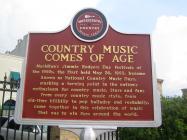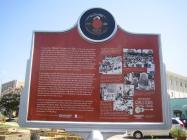Inscription
Front
Meridian's Jimmie Rodgers Day festivals of the 1950s, the first held May 26, 1953, became known as National Country Music Days, marking a turning point in the nation's enthusiasm for country music. Stars and fans from every country music style, from old-time hillbilly to pop balladry and rockabilly, came together in this celebration of music that was to win fans around the world.
Rear
Country Music Comes of Age In 1953, as the twenty anniversary of Jimmie Rodgers? death on May 26th approached, his musical heirs, along with his family and citizens of his hometown of Meridian, set out to honor his memory in a way that would further his legacy. Country stars Ernest Tubb and Hank Snow, both fans and acolytes of Jimmie music whose careers had been helped along by his widow, Carrie Rodgers, initiated a project to have a Jimmie Rodgers monument designed and erected. They planned to stage a "huge," well-publicized country music show as the monument was unveiled. The Meridian Star newspaper and Meridian city council were already planning to celebrate Meridian history as a railway center with the dedication of a steam locomotive to the deceased railroad men of the town; combined, they would be called officially "Jimmie Rodgers and Railroadmen Memorial Day," but the event would have significance that was much broader. It would be a milestone in country music history.
In Jimmie Rodgers, the global industry developing and gelling around country music in the 1950s found a father figure who?d stood for bringing the rural and urban together, for modernizing the music but never forgetting the folks down home. What he was about, country music was now about. Performers from every far-flung flavor of country came to Meridian to perform that day: Hank Thompson, Leon McAuliffe and Tommy Duncan from Western Swing; Lefty Frizzell, Jimmie Dickens, and Webb Pierce from honky tonk; Jim Reeves, Marty Robbins and George Morgan representing the rising new country pop sounds, and such traditional country legends as A.P. Sara, and Maybelle Carter, Bill and Charlie Monroe, Jimmie Davis, and Roy Acuff. In the years that followed, Elvis Presley, Johnny Cash and others would add the new rockabilly sounds. Tens of thousands of country music fans filled the streets of Meridian for the parades and shows that became annual events for decades to come.
In effectively and deliberately demonstrating country music strength and reach, in presenting it as a worthy and dignified addition to American culture with a history worth noting as well as a promising future, The Jimmie Rodgers Festivals paved the way for such developments as the Country Music Association and its later "Fan Fair" festivals, and the Country Music Hall of Fame. For country music, the festivals? advent in these streets in 1953 was a moment of self-recognition and acceptance—of coming of age.
Details
| HM Number | HM1GNS |
|---|---|
| Series | This marker is part of the Mississippi: Mississippi Country Music Trail series |
| Tags | |
| Marker Number | 11 |
| Year Placed | 2011 |
| Placed By | The Mississippi Country Music Trail, U.S. DOT(FHA), & MS DOT. |
| Marker Condition | No reports yet |
| Date Added | Monday, September 1st, 2014 at 5:33am PDT -07:00 |
Pictures
Locationbig map
| UTM (WGS84 Datum) | 16S E 340083 N 3581985 |
|---|---|
| Decimal Degrees | 32.36338333, -88.69966667 |
| Degrees and Decimal Minutes | N 32° 21.803', W 88° 41.98' |
| Degrees, Minutes and Seconds | 32° 21' 48.18" N, 88° 41' 58.8" W |
| Driving Directions | Google Maps |
| Area Code(s) | 601 |
| Which side of the road? | Marker is on the right when traveling South |
| Closest Postal Address | At or near 2214 4th St, Meridian MS 39301, US |
| Alternative Maps | Google Maps, MapQuest, Bing Maps, Yahoo Maps, MSR Maps, OpenCycleMap, MyTopo Maps, OpenStreetMap |
Is this marker missing? Are the coordinates wrong? Do you have additional information that you would like to share with us? If so, check in.
Nearby Markersshow on map
Show me all markers in: Meridian, MS | Lauderdale County | 39301 | Mississippi | United States of America
Maintenance Issues
- What historical period does the marker represent?
- What historical place does the marker represent?
- What type of marker is it?
- What class is the marker?
- What style is the marker?
- This marker could use another picture or two.
- Can this marker be seen from the road?
- Is the marker in the median?


Comments 0 comments